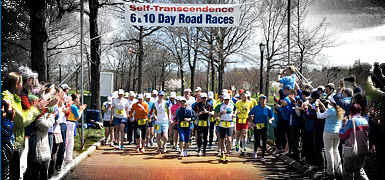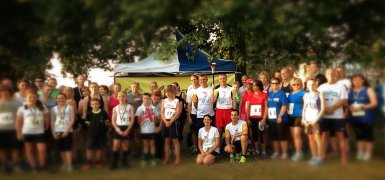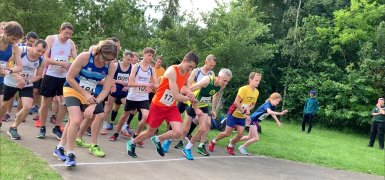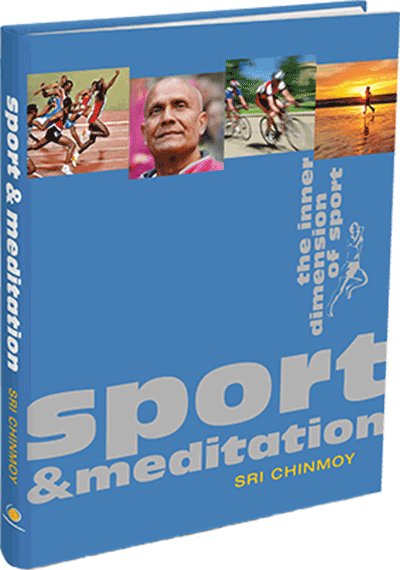Ultra training
With the announcement of a Commonwealth ultra distance and mountain running championship in the Lake District in 2009,interest is being kindled amongst established ultra-marathon runners to improve standards and also for experienced marathon and hill runners to give 100k or 24 hours an opportunity.
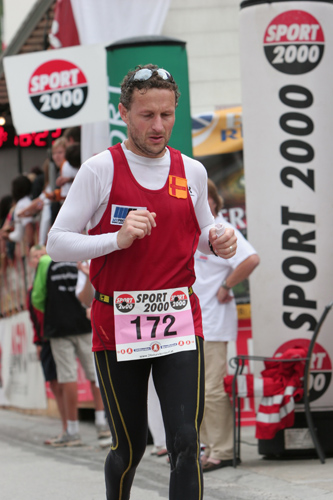 br>
br>Above: Ultramarathoner William Sichel in the Swiss 24 Hour Championships, Basel, May 2007
For many athletes and road runners, the very words"ultra distance" conjure up either the madness of something so out of the box and wacky or something fearfully demanding, that they don't even want to go beyond hearing the phrase. So just what is involved in Ultra distance? Scotland and the UK has a long and successful tradition in ultras, so this article aims to see how a few successful Scots approach their events. Ultra distance competition or any distance beyond the standard marathon generally falls into two categories: on the hills and trails with classic events like our own 95 mile West Highland Way, Greece's 145 mile Spartathlon or the alpine"Tour de Mont Blanc" following a national iconic route, or the recognised international championship standard road races of 100km and 24 hours.
As with most moves up in distance whether its 1500 to the 5000m, 10km to the marathon or the marathon to 100km, one of the hardest things to do is decide you actually want to do it, and then you or your coach asking the classic question"OK, look at your event, what does it involve etc etc". Well it obviously involves staying on your feet for many hours .so it does need endurance training, how much you may ask and is there a need for any element of speed or resistance training. Some of Scotland's most successful and consistent athletes at ultra distance, Lossiemouth's Don Ritchie, Simon Pride and Orkney's William Sichel, seem to have different approaches to achieving similar goals. Ritchie was brought up in the club/harrier tradition, running for a committed club with a cross country and track background with a 10km pb of 30.54 and a marathon pb of 2.19.34. He was inspired by fellow Aberdonian Alistair Wood to have a go at the classic 55 mile (90km) London to Brighton race, an event he won twice before turning his attention to what was, in the mid-late 70s, becoming the standard European ultra distance of 100km. The rest, as they say, is history. In 1978 at Crystal Palace track, Ritchie ran 6 hours 10 min 20 secs for 100k, a time that is still the fastest time recorded for the distance. Almost 30 years later the IAAF registered road best is only 6.13.33 despite many attempts, by some formidable competitors with better marathon times, to better Donald's time. Ritchie also recorded a string of victories in major 100km events across Europe in the days before there were recognised championships and set world records at every distance from 50km to 200km on both road and track.
So what was the secret of his success? At the highest level, and at any level relative to your standard, the ability to handle a heavy training workload, in Ritchie's case, regularly logging 120-150miles a week, allied with a good basic speed, were key elements. This, plus a total commitment to your goal and an attitude that ultra distance was nothing strange, but just a natural progression from what he had been doing for years. Any runner can log enough slow miles to be able to complete a marathon or ultra marathon. The speed/endurance element built into training as it does for 10k and the marathon enables one to compete and hold a pace for longer. In an ultra event, you may not be going as fast as in a marathon, but you are trying to maintain a steady pace, possibly for several hours! The longer the event, the greater effort by heart and lungs to maintain even a moderate pace, will be enhanced if the heart and lungs have had the opportunity to exert themselves over extended periods in training. The myth that moving up to ultras"deadens your speed" has never washed well with Ritchie. The increased strength from the heavy workload plus continuing to do punishing schedules led him to reduce his marathon to 2.19.34 while still running quality 100k races.. Advice he imparted to Simon Pride, who on his way to winning the World 100km title in 1999 recorded new pbs for 10k and the marathon in his build up! Simon was also winning North of Scotland road and cross country titles and placing in the top 10 in the Scottish National XC. So, at the highest level, speed/endurance is still important- long mile/km intervals, with short recovery, and tempo runs or fartleks. In Pride's case on undulating forest tracks around his Moray home, all classic marathon sessions but still relevant to ultra training. Even for mere mortals the speed element shouldn't be neglected, Central's Jim Drummond (Mad Jim to his friends), a stalwart of 12 West Highland Ways and dozens of other ultra races and solo expeditions can be seen regularly turning out at club sessions and"trashing" himself in East Cross country events
By contrast, William Sichel, in his 20s, was an international standard table tennis player so had a strong training ethic. On giving up table tennis and moving to Orkney, he needed something to"keep himself fit" so started running for fun following a classic path that saw him run one or two marathons comfortably under 3 hours, then decided to take it more seriously. He reduced his marathon time down to 2.38 before deciding to enter the Scottish 100km championships in 1994."Willie who? fae Orkney" duly came to the big city (Edinburgh) and became Scottish 100km champion and went on to be a regular member of the G.B ultra distance team at both 100km and 24 hours. A biochemist by training he uses his scientific background to devise his own schedules, but found even after he started running"quality 24 hour events (he has a pb of 153.3miles) a big mileage didn't work for him as it did for Ritchie, but a quality 50-60 mile including speed sessions and long runs did. Sichel was also inspired to do a lot of his training with a home made weight vest which he added weights to, as his training progressed to increase resistance. Its worth noting that both Ritchie and Sichel either by accident or design also came into contact at times with sports scientists who took a keen interest in their endeavours. In Ritchie's case another Aberdonian Ronnie Maughan professor at Aberdeen and later Loughborough, in Sichel's case David Murie at Paisley University. Input and help from them was instrumental at times in discussing workload, diet and training . Also despite competing at world level in their events, you wouldn't hear them complain about lack of facilities, you just got out there and used what was available ..be it local sandunes or forest tracks for fartleks ..or Ritchie's famous"roughly half mile hill" from Lossie beach to the"crest of the Brae"."I'd run up as hard as I could, jog down ,and repeat; sometimes I'd count them sometimes I'd just do them till I was knackered" Orkney's State of the art indoor facility for a world ranked athlete was a treadmill and weight equipment in a shed on Sichel's smallholding on the tiny island of Sanday He even installed the electricity himself. Both these anecdotes tell you something about them as people but also gives an insight to the dedication needed to complete an ultra let alone compete well at them.
THE LONG RUN
How long should the long run be is often the most asked question? Two-thirds to three quarter distance as advocated in classic marathon training is stupid when you consider that could mean covering 40- 50 miles for a 100km and for a 24 hour or 100miler..Don't even go there..The recovery time needed will eat into the consistency of training that is the basis of all endurance based work. Build up to a distance you feel you recover from comfortably with maybe a day or two easy training afterwards. In the classic Question"look at your event what does it Involve" it does involve a long way but Time on your feet and the ability to still run well when tired (after several hours running) are also critical, and this can be replicated in ways that don't drive you to exhaustion. Back to back 20+ milers on Sat afternoon and Sunday morning; a full days work then a long evening run or effort session with a useful run the next morning etc are all ways to accustom the body to adapt to working while tired but still allowing recovery of a sort. Long journey runs on road or trails .run out; Public transport or lift back or vice versa also break up the monotony of running big mileage on the same routes. So in Ritchie and Sichel's experience how long was the long run? For Sichel this was 20 miles but done with weighted vest and fairly hard, for Ritchie it was 50km done regularly every Sunday morning when in hard training. It is worth pointing out though that most ultra competitors of all standards will race regularly and use marathons, long hill races and shorter ultras as training efforts in the build up to their main races.
CAN WOMEN EXCEL AT ULTRAS?
Certainly, Pitreavie's Trudi Thomson ran successfully for G.B at 100km earning a silver medal in the 1995 world 100km event (7.42.17). Like Ritchie and Pride she trained fairly methodically with good results also representing G.B a the marathon. Helene Diamentides also was a natural ultra athlete on the hills and trails with the ability to run at good tempo for several hours. She used this amazing endurance base to run a creditable Comrades marathon(90km) and a few 100km championships in GB teams before concentrating back on her first love of the hills By contrast Gala's Kate Jenkins is a real"Free spirit", never really rigidly following a strict schedule. and happy to just head out on the hills and trails for several hours whenever inspired ..in Kate's case several times a week!!! This"training" though has worked for her purposes as she has several victories in the West Highland way race to her name, and is a previous course record holder. Whether she could do better at championship distances is open to conjecture .Although she has run numerous road marathons, she was once persuaded to run a 100km race and pulled out of the 5km loop course when well placed, citing boredom amongst other things! Reinforcing the idea that you really do have to have the Focus to succeed at ultras, and in Jenkin‘s case that focus is ideally suited to the open country.
 br>
br>Above: Competing in the Austrian 24Hr Championships, Worschach, July 2007
People have often asked me, how do you, or how could I, train for a 100km event or the West Highland Way? I usually say I can give you some advice of mine and of others experience, but you have to find the workload that suits you, which you can say is a bit of a cop out, but is echoed by other ultra runners. The hundreds of enthusiastic newcomers to running just looking to run there first 5km or 10km are often convinced there is an"Off the shelf, do it yourself training schedule" that will answer all their problems. And the same can be said of aspiring ultra runners. The reality, as with any activity, is a little different and although that will work to a point, your own strengths and weaknesses, play a big part in success or failure, and an athlete of whatever standard is not always the best placed to see what they are. There are key consistent elements that have to be tailored to each individual. The key to successful ultra training is to find over the course of weeks and months a workload you and your coach feel is challenging and progressive but is not so punishing that you spend all your spare cash at the physio or are prone to colds as a result of overtraining that has weakened your immune system, leading to missed days and weeks of training. Its classic consistent marathon schedules with the occasional heavy week or 10 days followed by a few easy days. Regarding the important aspect of diet, drinking and quality rest. As with marathon training, they should be seen as an integral part of the training routine and not a separate item to be paid little attention too. Not surprisingly fluid intake increases with extra training and as for watching what you eat, it's more the opposite of you are eating as much as you like (all healthy balanced stuff of course!!) and are still craving more .
I have found, in my own experience of running ultras for over 20 years (11 West Highland Ways and 22 24 hour events etc) the speed endurance element in training was always incredibly helpful even though in my own case I wouldn't say I had an abundance of natural speed. As mentioned earlier, your experience tells you, without selling yourself short, what workload you can handle safely. As for the experience of racing an ultra, that can't really be taught- talk is cheap as they say, and you've really just got to start off and run a"short ultra" 50k or 40 miles on the roads or the shorter version of the West Highland Way, the Highland Fling, or the Devil of the Highlands to find out: Ok this is for me! Until you take the plunge you just won't know. The confidence to do it grows with experience!
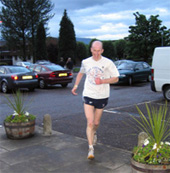
Above: Tarit Adrian Stott finishing the West Highland Way Race - an off-road ultra of over 90 miles.
Copyright 2007 Adrian Stott Former G.B 24 hour international and British 24hour champion

